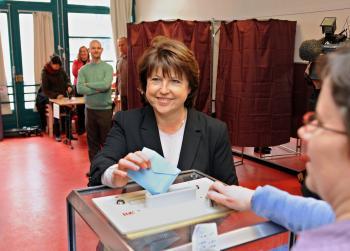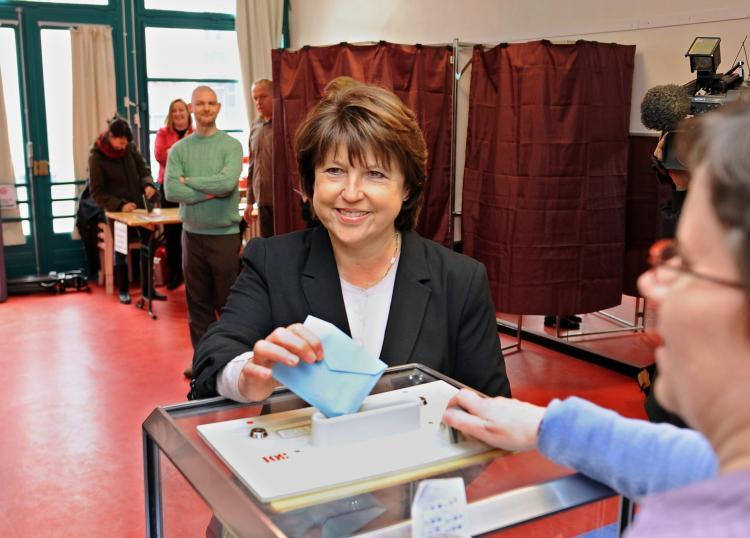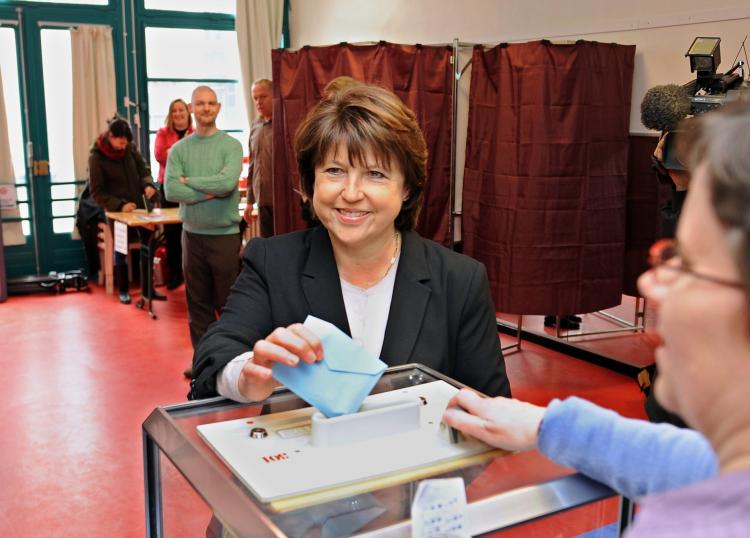PARIS—Emboldened by what has been described as an “overwhelming victory” in the first round of regional elections, the French opposition Socialist Party has made a deal with other left-wing parties to try to defeat right-wing UMP across France.
Socialist General Secretary Martine Aubry made the “big slam” during regional elections a key hallmark to the reconstruction of her long-divided Party, so as to be in order of march and anchored in French territories for the waited presidential campaign of 2012.
Aubry’s talking points to the media recently made it clear. Only one target: Nicolas Sarkozy. Only one message: French people suffer because of the “unfair and ineffective” politics of Sarkozy’s government.
“French voters have sent a clear and strong message, they refuse a divided, worried, and weakened France, they want a stronger and more just France,” Aubry told l'Express newspaper.
With 54 percent of voters not showing up for the poll, the first round of the elections was marked by an extremely low turnout. The last time first-round elections were held in 2004, voter turnout was 62 percent.
Socialists are interpreting the low participation rate as proof of widespread discontent with Sarkozy for failing to protect jobs.
The Conservative camp however claims that the turnout shows that Socialists have been unable to mobilize voters in their ‘veto the president’ campaign.
“Where is there a ‘punitive vote' when half of the voters did not even go to polls?” asked Xavier Bertrand, UMP secretary-general, on TF1 TV.
On Monday, Prime Minister François Fillon, however, had to discipline his own camp after some voiced that it is already too late to reverse the trend of defeat.
“All of those who expect, by their criticism, to weaken our majority, make a mistake against this majority. Once the second round is over, it will be time to find some lessons in the way we have managed things … but between the two rounds, we have to engage together.”
Particularly controversial inside UMP is the role played by Immigration Minister Eric Besson in the high number of votes obtained by far right, Front National in southern France. Many argue that Besson’s failed “national identity” debate only served to promote Front National’s anti-immigration stance.
After dark days since 2007, Front National President and founder Jean-Marie Le Pen showed pride when commenting to French media, “Front National is still a national power, very likely an ever-growing power,“ adding that voters should ”elect Front National regional counselors, as they will be the only opposition voices in these bodies.”
At the national level, Front National rose from 6 percent of the vote in the 2009 European elections, to 12 percent in this recent vote, scoring as much as 20 percent in some regions.
In three regions, left-wing parties—mainly the Socialist Party and the green party Europe Ecologie—will run separate candidates in the next round of elections. The situation, know as a “triangular,” occurs when several candidates garner more than 10 percent of the vote during the first round of regional elections, and thus survive to the next round, rather than merging their party lists.
However, a large victory for the left wing in most regions, projected by the polls for the last several weeks, still seems likely given their showing of 30 percent in first round, and the quick alliances that have been built to defeat Sarkozy’s UMP.
Regional voting has traditionally mirrored the national government in reverse: Right-wing leaders headed most French regions in the 1980s when the president was socialist François Mitterand. Now that conservatives have executive power plus a strong majority in both Parliament houses, the regions are inclined toward creating a counter power in a vivid expression of democracy. It remains to be seen if UMP will be able to keep one of the two regions it currently controls, and if a governmental reorganization will follow results of the second round.
France will go to the polls for the second round of voting on March 21 to elect representatives in 26 regions. Sarkozy will face presidential elections in 2012.
Socialist General Secretary Martine Aubry made the “big slam” during regional elections a key hallmark to the reconstruction of her long-divided Party, so as to be in order of march and anchored in French territories for the waited presidential campaign of 2012.
Aubry’s talking points to the media recently made it clear. Only one target: Nicolas Sarkozy. Only one message: French people suffer because of the “unfair and ineffective” politics of Sarkozy’s government.
“French voters have sent a clear and strong message, they refuse a divided, worried, and weakened France, they want a stronger and more just France,” Aubry told l'Express newspaper.
Low Turnout
With 54 percent of voters not showing up for the poll, the first round of the elections was marked by an extremely low turnout. The last time first-round elections were held in 2004, voter turnout was 62 percent.
Socialists are interpreting the low participation rate as proof of widespread discontent with Sarkozy for failing to protect jobs.
The Conservative camp however claims that the turnout shows that Socialists have been unable to mobilize voters in their ‘veto the president’ campaign.
“Where is there a ‘punitive vote' when half of the voters did not even go to polls?” asked Xavier Bertrand, UMP secretary-general, on TF1 TV.
On Monday, Prime Minister François Fillon, however, had to discipline his own camp after some voiced that it is already too late to reverse the trend of defeat.
“All of those who expect, by their criticism, to weaken our majority, make a mistake against this majority. Once the second round is over, it will be time to find some lessons in the way we have managed things … but between the two rounds, we have to engage together.”
Rebirth of Far-Right Front National
Particularly controversial inside UMP is the role played by Immigration Minister Eric Besson in the high number of votes obtained by far right, Front National in southern France. Many argue that Besson’s failed “national identity” debate only served to promote Front National’s anti-immigration stance.
After dark days since 2007, Front National President and founder Jean-Marie Le Pen showed pride when commenting to French media, “Front National is still a national power, very likely an ever-growing power,“ adding that voters should ”elect Front National regional counselors, as they will be the only opposition voices in these bodies.”
At the national level, Front National rose from 6 percent of the vote in the 2009 European elections, to 12 percent in this recent vote, scoring as much as 20 percent in some regions.
Announced Socialist Victory, Few Visible Divisions
In three regions, left-wing parties—mainly the Socialist Party and the green party Europe Ecologie—will run separate candidates in the next round of elections. The situation, know as a “triangular,” occurs when several candidates garner more than 10 percent of the vote during the first round of regional elections, and thus survive to the next round, rather than merging their party lists.
However, a large victory for the left wing in most regions, projected by the polls for the last several weeks, still seems likely given their showing of 30 percent in first round, and the quick alliances that have been built to defeat Sarkozy’s UMP.
Regional voting has traditionally mirrored the national government in reverse: Right-wing leaders headed most French regions in the 1980s when the president was socialist François Mitterand. Now that conservatives have executive power plus a strong majority in both Parliament houses, the regions are inclined toward creating a counter power in a vivid expression of democracy. It remains to be seen if UMP will be able to keep one of the two regions it currently controls, and if a governmental reorganization will follow results of the second round.
France will go to the polls for the second round of voting on March 21 to elect representatives in 26 regions. Sarkozy will face presidential elections in 2012.







